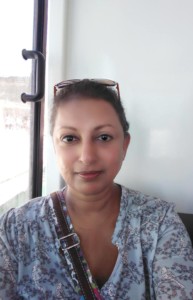Postcolonial Education Part I: An educational journey through a historical and autobiographical lens
3 perspectives on the educational systems in different countries and societies
This blog is intended as an opening conversation that could create further layers of understanding of our changing world, in terms of migration. The focus is on undocumented/irregular migration. Migration for those without means and the right paperwork can be precarious and unfortunately has a gender dimension in terms of the vulnerability of women and girls to exploitation. The discussion focuses on the irregular migration journey women, men and children embark on for a better life and the reality of their outcomes.
by Santhi Corcoran
I was born in Malaysia where my father was a primary school principal. My parents were committed to education and educational activism in supporting local communities and children in attaining access to education. Malaysia has an accessible and well-resourced primary and post-primary education system in a country that is in essence trilingual. I was trilingual when I started school, not unusual and uncommon in a multicultural, multilingual and multifaith nation. A heritage language and English was taught at home, and I learned Bahasa Malaysia, spoken by the Malay community from everyday engagement and communication with local children and adults.
School was bi-lingual, multicultural and multifaith while it was a catholic institution, a convent and run by nuns. The teachers however were lay qualified educators from different cultures, ethnicities, and faiths. The convent consisted of pre-school, primary and post-primary. You were not just taught reading, writing and arithmetic and all other curricular subjects but also your ethos, values, beliefs, and worldviews were shaped by this model of education. However, despite its very western leanings in appearance, structure, and curricular context it was a space that was not contested in terms of faith, beliefs, or culture. It may not be the case now, but it certainly remained an inclusive space when I attended school with prayers spaces for Muslim students, Catechism free periods for those who were not catholic and a lack of questioning or proselytising for those who came from families that did not practice a faith. The school embraced diversity and had a landscape that featured students from all walks of life and all cultures. The curriculum was broad and global including history and geography, world religions and civilizations were explored.
Colonial history was a part of the educational process – Malaysia had been subjected to colonial rule on 3 occasions. First Portuguese occupation, 1511 – 1641 in search of the lucrative spice trade, then the Dutch with their Dutch East India Company, 1641 – 1825, and finally British 1825 -1957; Asia seen as a wealth source in the Empire. As a former kingdom rich in cultural heritage the settlement of traders and peoples from around the Asia-Pacific region had created in Malaysia a vibrant cultural and intercultural landscape. I am a descendent of that diversity both in ethnicity, culture, and faith. I may not have entirely appreciated the significance of this as a very young child but as an adult I am now indebted that I was able to experience this diversity in my life and education. Malaysia is very different now to the country where I spent my childhood, and these are recollections of a different time. I write here of a specific time in my childhood and history.
I was not knowingly othered and did not realise the impact that difference would have on a child who was treated in this manner. That was a lesson I would learn later, as I lived in the West. You could be an insider and easily also an outsider as bias does not just exist between communities but quite comfortably within communities.
As an older youth/adolescent, I spent some time in Australia attending their high school system. It was significantly different to the Malaysian model or the UK British model and yet had remnants of the colonial system that had permeated and left traces on educational delivery in most colonised countries. I attended a school that was run again by a religious order but incredibly progressive in its outlook and curriculum. I spent a short while there, but the Australia of my adolescence still evokes memories of diversity and a multicultural environment not necessarily an intercultural hybrid. That has changed, however as there are aspects of Australian society that are framed in multiculturalism, but not always interculturalism. Immigration has not automatically created interconnected and intercultural communities. There are environments where Australia can be deeply cohesive in terms of community and neighbourhoods and areas where lives are lived in parallel.
My other educational journey was and is in Europe, in Britain, which is home, but now exited from Europe. I have spent the longer and more significant part of my education and then professional training and development there. A place that does represent the ‘me’ and the familiar curriculum of my other educational landscapes. Seeped more in colonialism and yet fighting to create a different approach with each political upheaval and currently far removed from the model of education which my parents, my siblings, and I received.
The ‘Windrush generation’ and the accounts of ethnic communities from former colonial and commonwealth countries are poorly represented in the pages of history. Equally some periods in colonial Africa, and Asia – commonwealth countries, are missing from the broader annals of history. Asia’s experience of the second world war being a key example. The Japanese occupation of Malaysia and part of South East Asia is chronicled from the British experience and not the loss and devastation of local communities. The call for decolonising the curriculum should also be a call for authenticating the curriculum and the subject areas. Who writes the subject, who it is written for – the audience, and if it holds up to local scrutiny has not been adequately explored in education in my opinion.
My final journey has been in Ireland – where I work in academia and am also a doctoral researcher. Ireland has a very nationalistic and proud educational history. Once subject to colonisation and its language, culture and faith denied, it has on achieving nationhood, in 1916 focused on righting wrongs in terms of education – the education, culture and language once denied. It is a journey many colonised nations now in possession of independence take. The curriculum in Ireland has yet to however, change to reflect the diversity of its nation or it is growing multiculturalism. Interculturalism and inclusion are still hotly debated topics here in the context of the divide between multicultural classroom’s and monocultural staffrooms. Role models are not represented in education or academia for young people of bi-cultural or other identity backgrounds nor are they represented members of society within the pages of educational materials and resources.
I have had the privilege of a broad and diverse education through travel and the opportunity of living in different lands. My educational journey has given me the opportunity to note the different perspectives and pedagogical approaches that perhaps moulded and developed my worldview. It enabled my evaluation and understanding of bias, discrimination, and prejudice and equally ignorance. It was not an acceptance but a keen realisation that change was long overdue in educational systems and in the way we train and teach those who will be educators – Teachers.
This developed perspective includes a recognition that we are at cross-roads in terms of children in school, especially children of migrant and ethnic heritages needing a reassurance of their place in the pages of education and within their society. Their culture, faith, and ethnicity, represented not in a tokenistic presence on a page but as an integral part of the everyday landscape of western European society.
Diversity in terms of food, music, culture, and geographical environments are often embraced positively but to a certain extent ethnocentrism and xenophobia still exist. The presence of racism and discrimination and its impact on the developing child and their community indicates significant work is yet to be done. That is the constant work, research and aspiration of my colleagues and friends in education who continue to promote the prevention of ‘othering’ and the creation of inclusive and global learning environments and spaces. That in effect is the key challenge for education – to create inclusive and supportive spaces where differences are respected and the norm, for students and teachers, and the curriculum presents a decolonised and honourable account of their past. Where classrooms and staffrooms reflect a lived reality of diversity.

Santhi Corcoran is a Lecturer and Doctoral Researcher in Mary Immaculate College, University of Limerick, Republic of Ireland. She has a professional background in Healthcare, Public Health, Social Care, Social Psychology, Regeneration and Community Development. She teaches both undergraduate and post-graduate courses in Sociology of Education, Global Citizenship, Migration, and Intercultural Studies and post graduate programmes in Cross-Cultural Psychology.
Her research interests are in the field of Intercultural Competence and dialogue, Ethics, Psychology, Mental Health and well-being, Global Citizenship Education, and Diversity. She has contributed to health, education and migration research and developed programmes and services for displaced communities both in the United Kingdom and the Republic of Ireland.
Santhi is a member of the Anna Lindh Foundation in the Euro Med region and a participant of DialoguePerspectives, a Leo Baeck Foundation and German Federal Government Fellowship. She is also the co-founder and co-chair of the Midwest Migrant Community Network (MWMCN), based in Limerick, Ireland. This is a social justice and social action network that works with representatives from Education institutions, Community projects, NGO’s, Youth services and Health and Social Care Services and local organisations to promote community integration.
